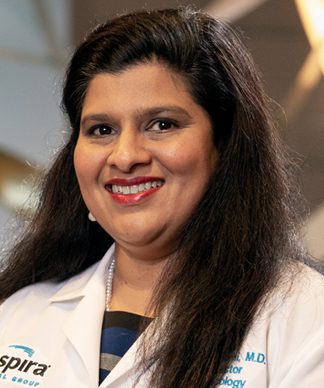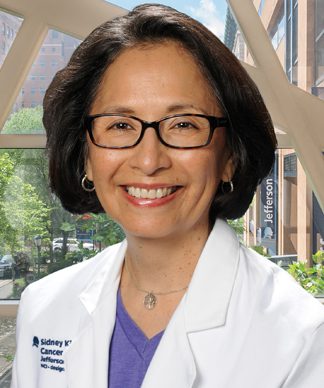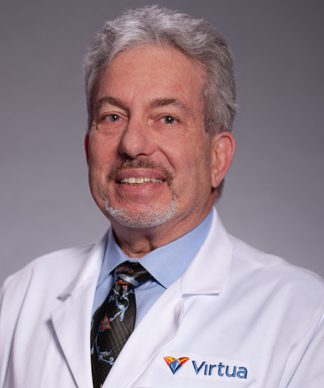Sure, we’re supposed to get all our cancer screenings done on a certain schedule. But what’s the harm in putting it off an extra month (or 2… or year)? Especially after the pandemic, when so many people put off annual screenings because of Covid fears, getting back on track is more important than ever.
You may feel like everything is a-okay right now, but that doesn’t mean there’s nothing brewing under the surface. Moral of the story: It’s time to get checked out.
Skin Cancer

Nandini Kulkarni, MD
Quick check: It’s June – are you wearing your sunscreen? Next check: When was the last time you got your skin cancer screening? If it was more than a year ago, it’s time to break out your mirror and take a look – then make a call to your doctor, says Nandini Kulkarni, MD, medical director of Surgical Oncology for Inspira Health.
Skin cancer screenings are recommended annually for anyone 20 and older. The screening can be done by a dermatologist or primary care physician who will make a head-to-toe assessment of your skin, she says.
But it’s not a once-a-year-and-you’re-done type of thing, she adds. Physicians recommend doing a self-check monthly.
“It doesn’t have to be anything big – just standing in front of the mirror and seeing if there is anything new on your skin, like a bump or brown spot that you haven’t noticed before,” says Kulkarni. “One simple guideline is the ABCDE for assessing a mole.”
“A” stands for asymmetrical: If one half of the mole doesn’t quite match up with the other, that can be cause for concern. “B” stands for border: If the outline of the mole or spot is irregular or blurred (as opposed to a clear-cut line), that’s out of the ordinary. “C” is color: If the color is light brown all over that’s fine, but if it was light brown for 2 years, and now it’s turned black or there are patches of white, red or even blue, get it checked out. “D” stands for diameter. Keep an eye on anything bigger than 6 millimeters, as that’s a red flag. “E” stands for evolving, so if it changes in any way, it’s time to head to the doctor.
“You don’t want to border on paranoia,” says Kulkarni, “but at the same time melanoma, especially, is a skin cancer that, if caught and detected early, can literally save your life. My rule of thumb: When in doubt, get it checked out.”
Lung Cancer

Ana Maria Lopez, MD
Lung cancer screenings are unique – not everyone needs them, but those who do need to be vigilant, says Ana Maria Lopez, MD, chief of cancer services at Jefferson Health – New Jersey Sidney Kimmel Cancer Center.
“These screenings are not for the general population,” says Lopez. “And on top of that, the guidelines are still fairly new. So our focus has been getting the word out.”
The American Cancer Society recommends lung cancer screenings for people who are between 50 and 80 years old in fairly good health who currently smoke or have quit in the past 15 years and have at least a 20-pack-a-year smoking history.
The screening itself is easy, she says – those who meet the criteria should receive a low-dose chest CAT scan once a year, where doctors will look for signs like pulmonary nodules or growths in the lungs that act as a clue that something may be off.
The danger of lung cancer is that, in its early stage when it’s easily treatable (even curable), many cases have few symptoms, she says. The timing is important too – some cases may worsen slowly, while others may go from stage 1 to stage 4 rapidly, leaving patients much more vulnerable if they put off a screening longer than they should.
But the best way to ward off lung cancer? Never start smoking in the first place, says Lopez.
“Lung cancer is a potentially preventable disease in the sense that the vast majority of cases come from smoking,” she says. “But the plus side is that, if caught earlier, it can be a curable disease. With these screenings, there’s an opportunity for earlier detection that otherwise wouldn’t be possible.”
Colon Cancer

Abraham Horn, DO
If there’s one type of cancer screening people want to avoid the most, it’s colon cancer, says Abraham Horn, DO, of South Jersey Gastroenterology. But he’s here to spread the message: it’s critical you get one, and it’s not as bad as you think.
“Colon cancer is one of the highest cancer killers for non-smokers in men, and the second highest killer for women, right behind breast cancer,” says Horn, a gastroenterologist. “It occurs often, but it can be so preventable.”
Colon cancer screenings are recommended for anyone 45 and older. That’s down from the previous recommendation of 50 – so if you thought you had more time, you may need to make an appointment. During the screening, doctors look for and remove lesions in the colon called “polyps,” which, if left alone, can start a cycle that leads to colon cancer. “
Polyps, for the most part, are quiet,” he says. “They don’t tip you off. There are no symptoms, no warning signs. There’s almost no way to know they are there without a colonoscopy.”
There are multiple types of screenings, like stool or blood tests, but they aren’t as accurate. Colonoscopies, he says, are the gold standard because they are the only tests that have been shown to not only catch, but lower, the cancer death rate.
“For some people it’s uncomfortable or intimidating – we get that,” says Horn. “It’s a sensitive area. People are worried, to put it nicely, that it’s a big instrument in a small area, but that’s not true at all. It’s a very small, flexible tube that’s manipulated very skillfully. Nobody feels anything.”
In fact, he says, the worst part is the prep.
“The cleaning out phase is annoying – no one has fun with that,” says Horn. “But that really is the most difficult part. And think, you only have to do it once every 5 to 10 years.”
“The biggest problem is that people use their nerves of the procedure itself to mask the biggest concern – what we might find,” he adds. “But when people come in with no symptoms, your chances of finding cancer is less than 3%. And if it is found at that stage, it’s typically very treatable.”














